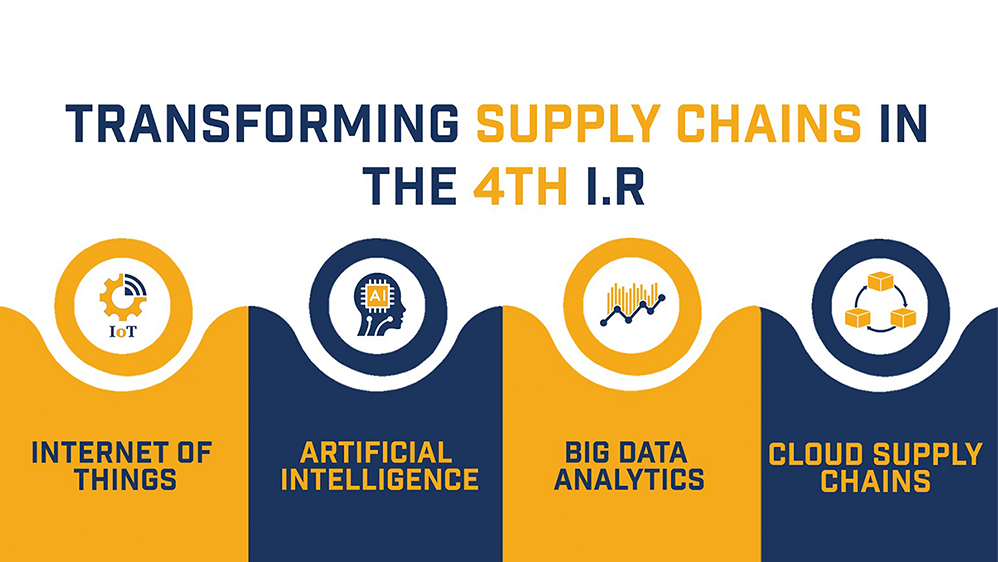The global economy has been influenced by four major industrial revolutions. The first of these, began in the late 18th century and was defined by the mechanization of textile production, the proliferation of the steam engine and a widespread switch from cottage industries to newly found factories. Following this, the second industrial revolution saw the emergence of assembly lines, the invention of the combustion engines, and the rise of large-scale corporations. More recently, the third revolution was defined by advancements in digital technology; including computers, the internet and other communication devices. Through these technological advancements, businesses experienced rapid globalization and expansion opportunities.
Since the start of the 21st century, we are at the dawn of a new era in innovation and industry. The Fourth Industrial Revolution is characterized by the seamless integration of tangible, digital, and biological technologies which creates a sound ecosystem for frictionless connectivity and collaboration. Some of the most transformational effects of the 4th IR can be seen in the logistics and supply chain sector, where revolutionary technologies have improved the way goods are sourced, produced and distributed. The most prominent technological advancements in logistics include the internet of things (IoT), artificial intelligence (AI) and machine learning, big data analytics and the use of collaborative platforms for enhanced efficiency and insight. Let’s explore the fascinating impact these innovations have on the logistics and supply chain industry.
1. Internet of Things (IoT) and Real-Time Tracking:
IoT devices embedded in vehicles provide real time information about the vehicle, such as its location, fuel levels, temperature variances, humidity levels and other parameters. This information allows stakeholders to track the location and condition of goods in transit, thereby enhancing visibility and transparency throughout the supply chain.
2. Big Data Analytics and Predictive Insights:
Companies can analyze vast amounts of market data to extrapolate useful insights on customer demand patterns, inventory trends and transportation routes. This allows them to come up with better inventory management algorithms through more accurate demand forecasts.
3. Artificial Intelligence (AI) and Machine Learning:
Enabled by big data analytics, AI and machine learning algorithms can help optimize various aspects of supply chain management. They can generate demand forecasts with greater accuracy and help manage inventories more effectively. In addition, machine learning software can suggest optimal routes for short-haul trips, ensuring that there is minimal fuel and time wastage.
4. Supply Chain Collaboration Platforms:
These platforms are cloud-based software solutions which aim to facilitate communication, coordination and the sharing of information in real time between various stakeholders involved in the supply chain. They are virtual hubs where manufacturers, suppliers, traders, and distributors can collaborate with ease, improving efficiency and responsiveness. By enhancing collaboration and information exchange, companies can respond more quickly to changing market conditions and customer demands.
Benefits of Supply Chain Collaboration Platforms:
• Improved Efficiency: Collaboration solutions shorten supply chain cycle times and improve operational efficiency by automating tasks, sharing data, and streamlining communication.
• Enhanced Visibility: Better risk management, more efficient resource allocation, and proactive decision-making are made possible by increased visibility into supply chain operations and performance measures.
• Faster Response Times: Partners in the supply chain are able to react swiftly to shifting market conditions, client requests, and supply chain interruptions thanks to real-time communication and cooperation capabilities.
• Reduced Costs: Collaboration systems assist in cutting expenses related to inventory holding, shipping, and order processing by optimizing inventory levels, minimizing stock outs, and doing away with unnecessary tasks.
• Improved Customer Satisfaction: Improved responsiveness and coordination throughout the supply chain result in less delivery errors, quicker order fulfilment, and superior customer support, all of which raise customer satisfaction levels.
In conclusion, a surge of technological innovation brought about by the Fourth Industrial Revolution is transforming supply chain management and logistics. These developments are increasing productivity, adaptability, and sustainability throughout the supply chain ecosystem. Companies must embrace these technologies and take a forward-thinking stance in order to prosper in the 4th IR era and maintain their competitiveness in the quickly changing global economy.
Mausool is pioneering the path toward achieving such competitiveness by proactively embracing modern practices within the logistics and supply chain industry. Our aim is to streamline procurement, sales, and distribution in the Saudi Arabian market. Visit our website to discover how we can transform your supply chain, generating unprecedented value for your business.
